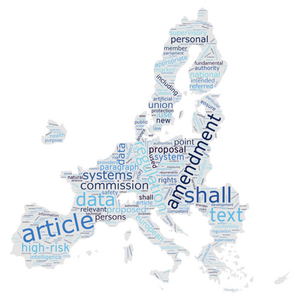Main page
Welcome to the ATLAWS-Wiki
ATLAWS - Atlas for Tracking Law And Watching Standards[1]

Introduction to the ATLAWS project
The ATLAWS project aims to create a "digital atlas" for EU digital legal acts. This will allow essential information to be clearly presented, objectively prepared through a co-creation process with the participating organisations, and enriched with key information on (thematically related) legal acts and standards. This aims to provide a quick overview of the current legal status.
ATLAWS should also allow organisations to delve into the details of legal acts to answer questions about, for example, their applicability and potential consequences.
The goal is, on the one hand, systematic information preparation, i.e., an approach that considers both the intricacies of individual legal acts and the synergistic effects between them, and on the other hand, target-group-specific information preparation, i.e., similar to electronic maps, information should be retrievable at precisely the level of detail (the "flight altitude") at which it is currently needed.
ATLAWS aims to answer four questions at a glance:
- Which "Acts", laws, directives, etc. are relevant to organisations?
- Which rules must organisations comply with?
- Where can synergies be achieved?
- What penalties or other consequences (loss of funding or public sector clients/customers) do organisations face in case of non-compliance?
The ATLAWS project follows a co-creation approach to enrich the elaboration, which is primarily carried out by staff of the Research Institute, with the perspective of the participating organisations, and thus promote mutual exchange.
Further information about the project can be found here.
Basic information about the project can be found on the following overview page.
For the english version follow the link.
Cluster
To foster the co-creation process and participation by ATLAWS stakeholders, the legal acts were divided into four thematic clusters, for which dedicated workshops were held. The four clusters (an initial description of each can be found by clicking on its title) are:
Cybersecurity
- Network and Information Security Directive (NIS2-RL)
- Critical Entities‘ Resilience Directive (CER-RL)
- Digital Operational Resilience Act (DORA)
- Cyber Resilience Act (CRA)
- Cyber Solidarity Act
- Cyber Security Act (CSA)
Artificial Intelligence
- Artificial Intelligence Act (AIA)
- Product Liability Directive (PLD)
- AI Liability Directive (AILD) [currently withdrawn by the Commission]
Digital Services and Markets
- Digital Markets Act (DMA)
- Digital Services Act (DSA)
- Regulation on electronic identification and trust services (eIDAS [2.0])
- Ecodesign for Sustainable Products Regulation (ESPR)
Data Strategy
Participating Organisations in the ATLAWS Project
List of Participating Organisations in the ATLAWS Project
Co-Creation Workshops
Information and materials (presentations, recordings) from the workshops conducted can be found here.
Staff Members in the ATLAWS Project
Notes
Note on Inclusive Language
The relevant legal texts typically use the generic masculine for the description of natural and legal persons. Terms such as, e.g., "manufacturer", "provider", or "user" are therefore not designations chosen by the drafters, but are legally defined terms.
In all other cases, the gender star is used to ensure non-discriminatory language use.
Disclaimer on Legal Advice and Liability
The content in this wiki is for general information purposes only and is not a substitute for legal advice.
The Research Institute accepts no liability for the accuracy and content of the information provided.
Help
Visit our Help Page.